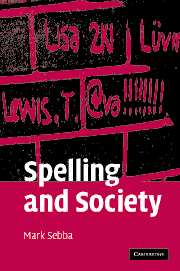Book contents
- Frontmatter
- Contents
- Illustrations
- Maps
- Diagrams
- Tables
- Acknowledgements
- Note on transcription
- 1 Map showing location of languages in Europe mentioned in this book
- 2 Map showing location of languages outside Europe mentioned in this book
- Introduction: society and orthography
- 1 Approaching orthography
- 2 Orthography as social practice
- 3 Language contact, linguists and the emergence of orthographies
- 4 ‘Postcolonial’ Orthographies
- 5 Between language and dialect: orthography in unstandardised and standardising vernaculars
- 6 Reform or revolution: where angels fear to tread
- 7 Why do we spell?
- Glossary
- References
- General index
- Index of language names
- Index of surnames
6 - Reform or revolution: where angels fear to tread
Published online by Cambridge University Press: 22 September 2009
- Frontmatter
- Contents
- Illustrations
- Maps
- Diagrams
- Tables
- Acknowledgements
- Note on transcription
- 1 Map showing location of languages in Europe mentioned in this book
- 2 Map showing location of languages outside Europe mentioned in this book
- Introduction: society and orthography
- 1 Approaching orthography
- 2 Orthography as social practice
- 3 Language contact, linguists and the emergence of orthographies
- 4 ‘Postcolonial’ Orthographies
- 5 Between language and dialect: orthography in unstandardised and standardising vernaculars
- 6 Reform or revolution: where angels fear to tread
- 7 Why do we spell?
- Glossary
- References
- General index
- Index of language names
- Index of surnames
Summary
[The new orthography] would be a significant move in the direction of further trivializing our pronunciation, in the direction of wasting the energy invested by our ancient forefathers in our difficult and rough, but richly and variously woven … language.
(Polish literary critic Karol Ludwik Koniński, quoted by Rothstein (1977: 230)on the 14 October 1996 the title-page of Der Spiegel famously implored its readers: ‘Rettet die Deutsche Sprache!’ … The discursive drift which had characterised much of the debate was now seemingly complete. No longer was this a dispute about orthography. It was not even a question of the written language. What was clearly at stake here was the German language in all its force as a signifier of cultural and national identity.
[Johnson 2000: 120]Traditions will be destroyed, new textbooks will have to be printed, new teaching methods developed, books translated, teachers retrained. Huge funds will have to be spent on all of this … It will cause a split in our society. It will be difficult for people to learn how to read and write anew … The link between generations will be broken.
(Petition against script reform to the Tatarstan parliament, September 2001)An intractable problem
Introduction
‘Many can squabble over a single letter as though the well-being of Europe depended on it.’ So said the eighteenth-century Dutch writer Z. H. Alewijn (1742–1788). If we look at the history of orthographic reforms and attempted reforms, we can see the truth of this.
- Type
- Chapter
- Information
- Spelling and SocietyThe Culture and Politics of Orthography around the World, pp. 132 - 156Publisher: Cambridge University PressPrint publication year: 2007
- 1
- Cited by

